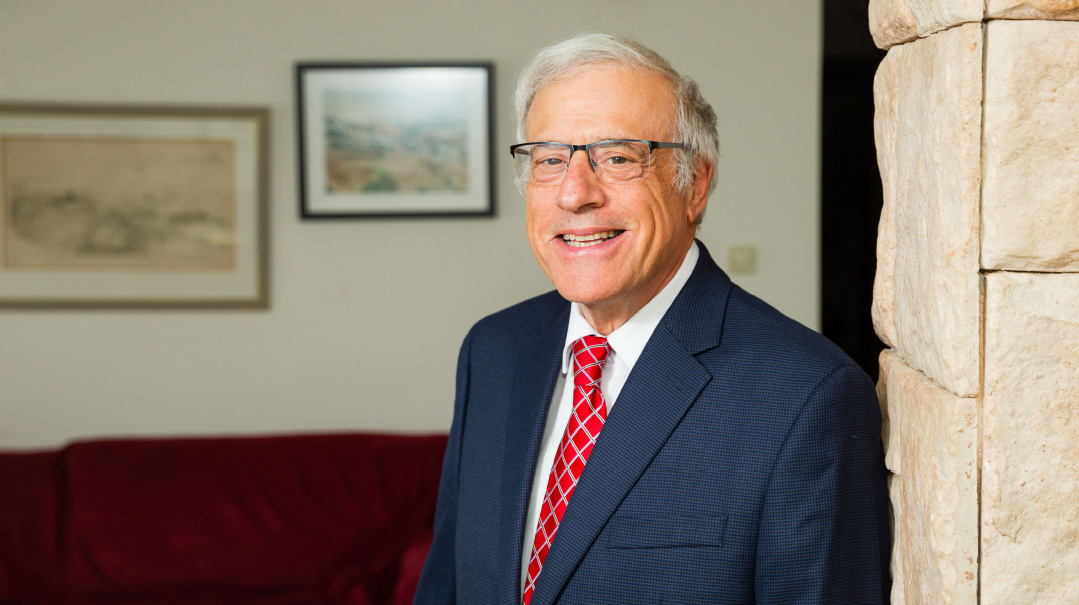All Roads Lead to Iran

Veteran Pentagon researcher Dr. Harold Rhode warns the West: A show of weakness is the route to disaster

Photos: Elchanan Kotler
When news of Hamas’s deadly Simchas Torah attack filtered through to his Florida community, former Pentagon advisor Dr. Harold Rhode — a specialist on the Islamic world — was horrified, but not entirely surprised.
“For years I have been very worried about America growing closer to Iran, which has manifested itself in a relationship of American submission,” he told Mishpacha in a wide-ranging interview. “America has made huge concessions to Iran, which frankly are hard to understand. Just recently, the US transferred $6 billion to Iran, and it’s clear that the Iranians treated it as a weakness. And in the Middle East, when you perceive weakness, it’s an invitation to attack.”
With Israeli forces battling an Iranian terror proxy in Gaza, international shipping threatened by the Iran-funded Houthis, and American troops under attack by Iranian-backed forces across the Middle East, now is the time to connect the dots that lead back to Tehran.
And yet, says Harold Rhode, America seems intent on treating Gaza as a discrete problem, and forcing Israel to stop fighting before Iranian influence has taken a body blow.
“It’s clear to me that Iran is behind a very significant part of the October 7 attack,” he says. “The fact that Iran funds Hamas is well known, but I believe that Iran was very instrumental in organizing this attack as well. The Iranians, in contrast to Hamas, are excellent long-term planners. Iranians are chess players and rug makers. That means they have patience. They’re not just thinking of the move they’re making now — they’re thinking six moves down the road. What is a rug maker? He’s got patience. You can’t just make a rug — it’s slow and slow, one hooked thread at a time.”
Having lived and studied across the Middle East and wider Islamic world, Dr. Rhode sounds a warning bell about the lack of American understanding of the dynamic that has brought together Hamas and Iran, across the Sunni-Shi’ite divide, to attack Israel in what is essentially an attack on the United States as well.
“We have to understand that Muslims divide the world into Muslim believers and al kuffar, the Arabic term for people who are not Muslims, whom they fight against. From their point of view, the country that leads the world’s ‘non-Muslims’ is America, and in the Middle East it’s Israel.”
Dr. Rhode, who holds a PhD in Islamic history and who’s conducted research in Egypt, Syria, Jordan, Iran, Afghanistan, Turkey, Uzbekistan, and Kazakhstan, served as an advisor on Islamic culture for 28 years in the US Department of Defense, is now a distinguished senior fellow at the Gatestone Institute and a popular political writer.
He explains that the Iranian goal is to promote Shiite Islam throughout the world, and although Hamas is Sunni, the Iranians are ready to swallow this difference and fund Hamas with the hope that they will be able to strengthen their power against the wider US-led alliance.
(While most of the Muslim world is Sunni, Shi’ite Islam is the dominant sect in Iran and Iraq, a major difference being that Sunnis rely on the teachings of Muhammad to guide their actions while Shiites rely on their ayatollahs, whom they see as a sign of G-d on earth. Both groups, however, believe that once a territory is conquered and Islamicized, it must be ruled by Muslims forever. And that, of course, also includes the Land of Israel, ruled by Muslims before the Crusades. True, there can be temporary truces that may even last for centuries, but Muslims cannot recognize the right of Jews to permanently rule any part of the Holy Land.)
“That’s how the Arab mentality works,” says Rhode. “They work slowly, they’re in no hurry. Like a tiny termite that slowly eats away at a wooden house and eventually topples it — that’s how Iran works, in Israel and in America. The termite appears small at first, but the final goal is to topple the whole structure of the State of Israel.”
From his vantage point in far-away Florida, that wide-angle view of the Gaza war is one that Harold Rhode has developed since the Simchas Torah attack. It’s a worldview born of decades of travel and study in Iran, Iraq, Egypt, Jordan, Afghanistan, and among the Palestinians. Along the way, his encounters with the Muslim world’s fierce adherence to its beliefs prompted the Philadelphia native, who grew up religiously uncommitted, to examine his own Jewish roots, sparking a return to observance.
It also taught him something crucial about strength in the Middle East. In this region, the show of weakness the likes of which the White House seems intent on forcing on Israel is a road to disaster.
Oops! We could not locate your form.







